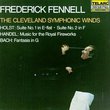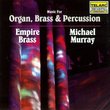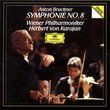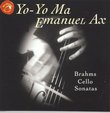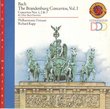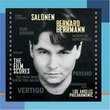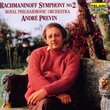| All Artists: Giuseppe Verdi, Claudio Abbado, Angela Gheorghiu, Roberto Alagna, Daniela Barcellona Title: Verdi - Messa da Requiem / Gheorghiu · Barcellona · Alagna · Konstantinov · Berliner Philharmoniker · Abbado Members Wishing: 0 Total Copies: 0 Label: EMI Classics Release Date: 11/20/2001 Album Type: Live Genre: Classical Styles: Opera & Classical Vocal, Historical Periods, Early Music Number of Discs: 2 SwapaCD Credits: 2 UPCs: 724355716828, 724355716859 |
Search - Giuseppe Verdi, Claudio Abbado, Angela Gheorghiu :: Verdi - Messa da Requiem / Gheorghiu · Barcellona · Alagna · Konstantinov · Berliner Philharmoniker · Abbado
 | Giuseppe Verdi, Claudio Abbado, Angela Gheorghiu Verdi - Messa da Requiem / Gheorghiu · Barcellona · Alagna · Konstantinov · Berliner Philharmoniker · Abbado Genre: Classical
Verdi's Requiem--certainly one of his most moving, eloquent masterpieces--was written in honor of the great Italian poet Alessandro Manzoni, whom he admired enormously both for his writings and his political outlook. Thoug... more » |
CD DetailsSynopsis
Amazon.com Verdi's Requiem--certainly one of his most moving, eloquent masterpieces--was written in honor of the great Italian poet Alessandro Manzoni, whom he admired enormously both for his writings and his political outlook. Though its text is the Latin liturgy, it has been called Verdi's greatest opera because of its basically dramatic character, as well as his own ambivalent attitude toward organized religion. Thus, interpretations tend to emphasize its secular or its sacred aspect, though, naturally, the soloists are trained in the Verdi opera tradition. For example, Toscanini's legendary performance, recorded live at Carnegie Hall in 1951, takes exactly the opposite approach to this version. Inwardly expressive, noble, devout, pleading, prayerful, yet with plenty of dramatic intensity, the Toscanini encompasses every human emotion and offers a synthesis of Verdi's vision of the earthly and the sublime. The performers on this recording, captured live on the 100th anniversary of Verdi's death, take the theatrical view. The soloists swoop and slide, sob and sigh, and overdramatize the fear and trembling. Tenor Roberto Alagna belts out his part in the best operatic style, the bass sounds rough, the alto's vibrato wobbles, but soprano Angela Gheorghiu soars radiantly. The choruses are good, the orchestra is wonderful, but the dynamic contrasts go from inaudible to ear-splitting. --Edith Eisler Similarly Requested CDs
|
CD ReviewsA highly emotional experience vocalfanatic | Ramat-Hasharon Israel | 12/08/2001 (5 out of 5 stars) "For starters, let me state that to my mind, Verdi's Requiem Mass is an extremely difficult work to bring off successfully, not because of any technical difficulties (they are legion: yet Beethoven's Missa Solemnis tops the Requiem in that respect), however the juxtaposition of operatic arias amidst quasi-rennaissance motet writing and the unique Verdi setting of the Day of Judgement poem - as visual as Michaelangelo's Dies Irae fresco - presents an architectural problem - emotion or cold-blooded build-up? Lets take for an example the opening "Requiem aeternam" chorus, where the tune (sung by the soprano in the a-capella section that appears in the very last part, written, incidentaly, some 5 years before the Requiem) is played by the violins, yet the chorus utters the words, sottovoce. What should the conductor do ? Overcharge the violin melody with devotion and passion, and thus lose the sense of direction (as with Gardiner and Giulini) or paint it with large strokes and let us figure for ourselves the "emotional" ingredient (as with Toscanini)? There has to be a balance between head and heart in this piece, and I do think that Abbado achieves precisely that quality, missing from, lets say, 95% of the available versions on record. Furthermore, I sincerely believe that this particular Requiem needs the ambience of an audience in order to make things happen. Studio versions sound merely studio bound (apart from the Giulini and Gardiner, which also sound a bit manufactured). I have never heard a live version of the Requiem which hadnt some fine ingredient in it. This one is no exception. I have seen and heard a live realy of this particular performance on the 27th of January 2001, and it was a profound and moving experience. Abbado being, supposedly, mortally ill (he looked on TV, alarmingly so, like a skeleton), and conducting his own "requiem", as it were. By the end of the piece, the C-major chords and the muttering of the soprano soloist amidst the chorus 'Libera me Domine de morte aeternum", the camera focused on Abbado, he being unable to dimiss the silence at the very end of the piece, unable to release his hands, he just stood there, weeping and shivering. Then slowly released the tension. The public honoured him by sitting still for some 2 minutes. On the recording, the producer did the most sensible thing by retaining the silence and fading out into oblivion after some 40 seconds. Apart from all that, let me at once state that I sincerely believe that here is the most perfectly sung and played version availbale. The Berliner Philharmoniker cover themselves with glory. The massive choral forces ammassed here (two Swedish choirs, one Spanish) are simply stupendous. The soloists were (and are) problematic, concering the male voices. The Bass is inadequate, yet he too gets into the spirit of the performance by the "Lacrymosa". Alagna is, well, Alagna, I really dont like the way he sounds today and the lifting-up to notes, a-la Carreras. Yet he phrases most beautifully and is sincere and often very moving. The Mezzo is a find - a truly Italian-sounding voice, with the heft - and sensitivity - required. People who read my reviews here will already have realized that I am a huge and utterly undiscerning fan of Angela Gheorghiu, The most exciting and individual voice and musical personality currently before the public. Her voice doesnt flinch from the demands she piles on it, on the contrary, it blossoms by the month into a full and warm instrument. She sounds here much, much better than she sounded back in the 1994 Solti La Traviata. In fact, I think she is the most moving soprano soloist on any version. I always thought that for this piece you needed a pure, seamless sound (Margaret Price, Susan Dunn etc) but the dark quality present in Gheorghiu's voice does wonders for the soprano part. She has all those dark colours, yet she is able to float the voice, when needed. All in all, a riveting experience, by the time those C-major chords will fade into the distance, you will take the first CD and start it all over again...." A superb recording of Verdi's Requiem The Cultural Observer | 06/18/2007 (5 out of 5 stars) "Verdi's Requiem is one of my favorite pieces from the great Italian maestro. Although it was written in the structure of a Requiem mass, I think that Verdi's composition allowed his dramatic, operatic element to seep into its musical backbone. Many recordings of Verdi's requiem feature conductors who either highlight its spiritual qualities or its operatic qualities, but very few of them are able to coalesce these two in one successful interpretation. I usually like to recommend Solti's recording for its drive, Karajan's Berlin recording for its unnatural, gracefuly beauty, Muti's recording for its energy, Giulini's BBC recording for its spiritual quality, and Toscanini's for its so-called Verdian spirit. All of those Requiems are magnificent, but I would highly recommend this recording for its ability to combine a bit of everything into an interpretation that wins this listener into believing that it is the best Verdi requiem...ever. Abbado was known in his prime as one of the greatest Verdi conductors, and for the kind of musicality and elegance he brings to the score. From him was I able to hear the best Simon Boccanegra, Macbeth, Don Carlo, Aida, Un Ballo, and Falstaff. From this 2001 recording, we also have perhaps the most compelling recording of the maestro's Requiem we will ever hear in this lifetime. This recording has it all--the gravitas, the spiritual abandon, the despondence, the reverence, and the hope that a requiem mass would require for all its resounding themes of death. The Requiem that begins the piece is dealt with the kind of clean execution that the Berlin Philharmonic could only execute, and Abbado does this with an Italianate colour that you will never find in Karajan's recording with the same orchestra. The Dies Irae section is played with such virtuosity and ferocity that you'd almost feel like Solti's recording paled in comparison with the precise articulation of the Berliners. The Liber Scriptus, Recordare, and the Lacrymosa have never been played more beautifully in any other recording. In the Hostias, Abbado is able to imbue an Italianate grace into the music with the shimmering strings of the Berlin forces. It is an experience that every music lover must be able to experience. The Sanctus is played with a waltzy playfulness, while the Agnus Dei and the Lux Aeterna are given a sense of Spiritual longing and hope that gives the piece a most rewarding near-ending before the great Libera Me. The glorious Libera Me that ends this masterpiece has been conducted in the hands of Austrians and Prussians who give it a more Beethoven-like treatment or a Wagnerian drive that does not fit the musical writing, but Abbado gives us exactly what Verdi would probably have wanted, and gives the listener an unforgettable musical experience. This is Verdian conducting at its finest, and with such a great orchestra plus a collaboration of tonally and musically excellent choruses like the Swedish Radio Choruses and the Eric Ericson Chamber choir make this one of the most outstanding orchestral and choral collaborations. The soloists are perhaps one of the most commendable quartet of singers ever to have sung the parts. Roberto Alagna sings the tenor solos with the grace and fluency that typifies this great artist, whereas the bass Julian Konstantinov gives the music the gravitas recalling Nicolai Ghiaurov. Listen to the Confutatis and you'll know what I mean. Daniela Barcellona is an excellent mezzo, and although I still think Bumbry, Simionato, Ludwig, and Cossotto give more unforgettable readings of the alto parts like the Lacrymosa, Agnus Dei, and the Lux Aeterna, Barcellona more than holds up to these great names. I think her timbre is absolutely breathtaking and reverent, if one can describe it as such. Finally, there is Angela Gheorghiu, one of the best sopranos to sing the glorious solo parts. Gheorghiu is known as one of the best vocal painters due to the way she shades her voice in just about everything she sings. Has there ever been a better Libera Me? In my opinion, despite the fact that Freni, Scotto, and Tebaldi were more vocally endowed, no other soprano has made the Libera Me such a spiritually lifting experience. Five stars from this listener, and I hope that all of you will be encouraged to buy this great Requiem!" Emotionally powerful J. Seliong | Manchester | 07/08/2004 (5 out of 5 stars) "Abbado's conducting brings out the requiem beautifully (very lyrically) without losing its powerful earth-shattering impact on listeners.Highlights of the requiem include the Dies Irae, where the Berliner Philharmoniker explodes with amazing energy and force (the bass drum and timpany deserves special credit). Abbado doesn't take the Dies Irae too fast unlike other conductors, but he allows it to develop, and he does it just right. It invokes visions of the end of the world, judgement day, and fire and brimstone.The brass section of the BPO lives up to its reputation again, by their splendid handling of the Tuba Mirum, the soft trumpet fanfare escalating into a climax of blazing brass. They are indeed a very powerful section in the BPO.Gheorghiu is a good soprano, but she just doesn't match Ren?e Fleming or Sumi-jo in their intensity (especially at higher registers). She just comes across as a so-so soprano. Nothing bad, but not outstanding either.Barcellona, on the other hand, outshines the soprano in this recording. Her deep and lushious voice leaves you awe-struck. This is very evident in the final moments of the requiem (Libera me, Domine). Her singing brings a sense of urgency, and indeed reflects the track's title (Liberate me, God). Her singing is full of emotion, indeed a true singer of Verdi's operas.Alagna is difficult to review. You either love his singing, or despise it. To me, he seems alright, but most people think he's better singing other operas. He has, however, a problem with his tempo, and also a slight problem with his phrasing. He frequently sings ahead of the orchestra, never waiting for the music to "resolve" before taking in another measure of music. As for his phrasing, he seems to punctuate the music in the middle of a phrase, making it seem disjointed. His "Ingemisco" is indeed dissapointing. Other than that, he seemed perfectly able to hit the higher notes, which is indeed a pleasant surprise actually.Konstantinov doesn't show off much (much less than Alagna anyway), but he seems rather unpolished. He also swallows his words, very unlike Barcellona who has excellent diction.The three choirs are excellent, complementing the BPO nicely. The words sung can even be heard. Rex Tremendae, Dies Irae, Libera me, Domine and Lacrymosa show the choirs at their peak (listen to "Libera Me, Domine" to hear the ladies in the choirs singing, they're awesome! Fierce, sweet, emotional, exciting, and ear-shattering, all-in-one indeed). Abbado did a splendid job of keeping the choirs and orchestra together.I would have given this recording 4 stars (because of the soloists), but that would not do justice to the excellent conducting of Abbado, or the fine playing and singing of the orchestra and choir. The soloists are just mediocre, with the exception of Barcellona, but entirely, listening to this requiem is indeed a moving experience. You should buy it, despite the soloists. The fine playing and conducting more than offsets the flaws of the soloists. Exciting performance. Highly recommended."
|

 Track Listings (12) - Disc #1
Track Listings (12) - Disc #1